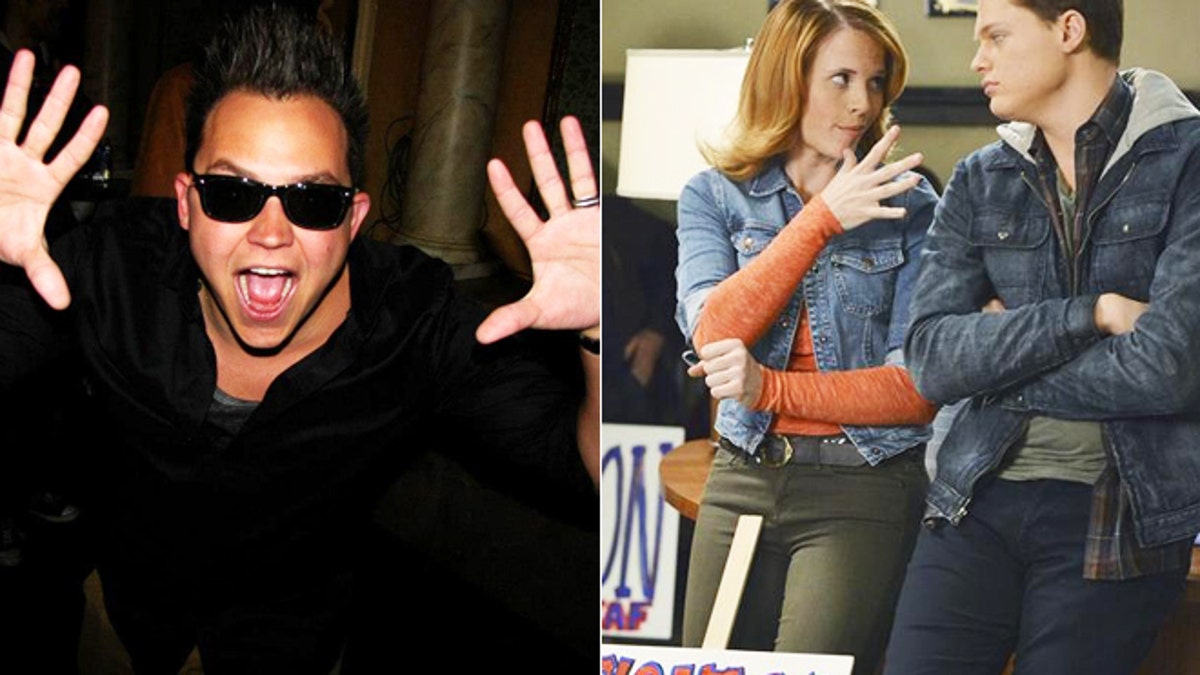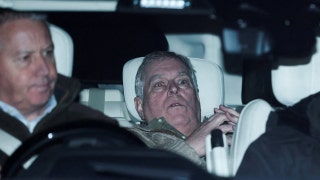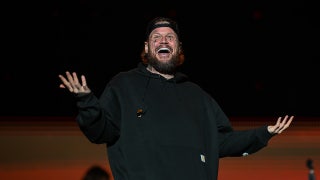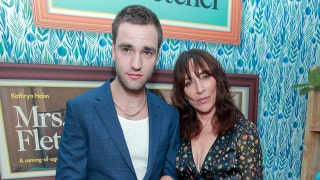
Deaf musician Sean Forbes (left), and Deaf actor Sean Beardy (right, with actress Katie Leclerc on 'Switched at Birth'), are some of the deaf and hard-of-hearing entertainers succeeding in mainstream music and TV. (Sean Forbes/Facebook/ABCFamily)
Musician Sean Forbes won the award for “Outstanding Hip-Hop Artist” at the Detroit Music Awards in April. He didn’t even realize it at first.
Why?
He’s deaf.
“Another rapper from Detroit came up to me and said ‘Congratulations Sean!’ and I thought it was for being nominated for Outstanding Hip-Hop Artist. When he told me ‘Dude, you won,’ I was like, ‘No way!?’” Forbes told FOX411. “I am so deaf I [didn’t] know what was going on.”
Deaf since infancy – and with both parents in the music industry – he always knew music was what he wanted to do. Buying his first drum set at the age of five, his parents always supported his dream.
- Then/Now: Our favorite ‘Baywatch’ stars
- Where did all of the female Hollywood super heroes go?
- Ex-Scientologists: Leah Remini’s departure has church on the ropes
- Lauren Bush Lauren works with Clarins cosmetics to help fight world hunger
- Imperfect storm? Lindsay Lohan’s rehab release and her film’s bad reviews has everyone talking about ‘The Canyons’
- Stars to veterans: We got your back
- Shark on a train! ‘Sharknado’ apocalypse hits New York City, maybe
“They gave me so much accessibility to music, but also a reality check. Making music wasn't something that everyone made a living doing, but I wouldn't give up on that dream,” Forbes explained.
Being deaf doesn't always mean not being able to hear or produce music – in fact, Beethoven was deaf while composing his most impressive symphonies. Forbes, like other Deaf people, is able to feel the beat of the music vibrating through his body.
One summer, while interning in Chicago with an engineering company, they were so impressed with his work ethic, they offered to pay for his college education. Rather than graduating and going right to work, making $70,000 a year, he chose to follow his heart.
“I didn't want to live my life wearing a suit and tie, riding an elevator…I wanted to do the one thing I truly loved,” Forbes said.
Classifying himself as a musician who just “happens to be deaf,” Forbes is also the co-founder of the Deaf Professional Arts Network (D-PAN). Founded in 2006, D-PAN works to promote professional development and access to the entertainment, visual and media arts fields for individuals who are deaf or hard of hearing.
"I know, in the next few years, with D-PAN and with my own music, people won't even look at it as 'Deaf people can do music?!' They'll look at it, like 'Wow! Those are some kick-ass entertainers,’” said Forbes.
Forbes isn't the the only entertainer working to make being deaf a secondary issue to their talents. Matt Hamill, now a UFC fighter, became the first Deaf wrestler to win a National Collegiate Wrestling Championship in 1997.
Actors and actresses are getting their chances, too. The ABC Family show “Switched at Birth” revolves around the lives of two girls – one deaf and the other who can hear – who found out they were switched at birth. The drama is ranked as cable television’s number one scripted telecast on Monday nights in its. timeslot, according to Nielsen.
The actors and actresses that portray deaf characters on the show are deaf or hard-of-hearing in real life as well. The show's producer told us that on the set, having a mixture of deaf, hard-of-hearing and hearing actors is not a problem.
“We're all totally used to having a bilingual set at all times. The deaf actors have interpreters with them but we all interact with our deaf colleagues with a mixture of signing, lipreading, and our own made-up signs,” Lizzy Weiss, the executive producer of the show, told FOX411.
In April, the show aired an episode that was told in American Sign Language, a first for mainstream scripted television. It was one of Weiss’s favorite episodes to work on.
“Paul Stupin and Shawn Wilt, my writers, all of our cast – we all had so much fun with the challenge of making an entire episode of network television without any vocalization,” she said.
But mixing the Deaf and hearing worlds is not always easy. Working in the music industry is a dream-come-true for Forbes, but he says stereotypes about deafness still exist.
“I've had people come up to me and say things like ‘Wow, you're deaf. I met another deaf person and they're not like you.’ First of all, everyone on this planet is different. Some have similar upbringings, similar experiences, but no one is the same.....the same goes for the Deaf community,” Forbes said. “I think that people need to expand their minds about everything as a society and stop judging people based on their appearance when you don't necessarily know a thing about them.”
Many in the Deaf community are thrilled to have a show like “Switched at Birth” that has deaf and hard-of-hearing characters, but Weiss says she still can't please everyone. "Overall, they're thrilled to have a show that portrays deaf and hard of hearing characters week in and week out as protagonists," she said. "Like with fans of any show, some people have issues with certain things. Again, I'm not doing the show to promote an agenda, and this isn't a documentary - it's a TV show, which means we choose stories that are universal, compelling, and emotional."
“I hope 'Switched' opens the door for a ton more stories about deaf characters and other people outside the mainstream,” Weiss added.
Forbes also hopes that the show’s representation of deaf characters will help hearing people to understand and embrace deafness and Deaf culture.
“Just put it in this context." he said. "We have a deaf fighter, a deaf rapper, deaf actors…all we need now are some bona fide deaf politicians."














































